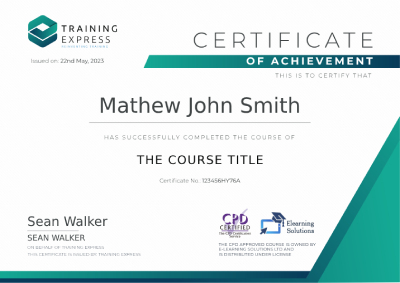GET THIS COURSE AND 1500+ OTHERS FOR ONLY £49 PER YEAR. FIND OUT MORE
Overview
This Anti-Money Laundering Course is a formal qualification for anyone who wants to learn more about money laundering and the career opportunities in this field. It provides up-to-date information to protect your organization from suspicious activity, with step-by-step training on how to conduct a client risk assessment.
This Anti-Money Laundering Training Course covers a range of topics from terrorist financing framework to customer due diligence checks and processes, deepening your understanding of the role of the money laundering reporting officer. You’ll learn how to develop a risk-based approach against financial crime that can be applied in any organization, as well as learn the policy and procedures for reporting suspicious activity.
Furthermore, this Anti-Money Laundering Course will equip you with the fundamental skills to work in this field, from problem-solving to data analysis. If you’re looking to kickstart a career in the financial department of an organization, then this practical online course is a must for you.
- Accredited by CPD
- Instant e-certificate and hard copy dispatch by next working day
- Fully online, interactive course with audio voiceover
- Developed by qualified professionals
- Self-paced learning and laptop, tablet, smartphone-friendly
- 24/7 Learning Assistance
- Discounts on bulk purchases
£44,800 Average Salary, Up to £71,700/yr for this skill according to top UK career sites.
Sneak Peek of The Anti Money Laundering Training Course
Who Should Take The Anti Money Laundering Course
This Anti-Money Laundering Course is ideal for anyone looking to kickstart a career in this field or who wants to gain a deeper understanding of money laundering and how to prevent it. That includes:
- Money Laundering Reporting Officer
- AML Analysts
- AML Officer
- Risk & Compliance Analyst
- Compliance Manager
Certification
Once you’ve successfully completed your Anti-Money Laundering Training Course, you will immediately be sent a digital certificate. Also, you can have your printed certificate delivered by post (shipping cost £3.99). All of our courses are fully accredited, providing you with up-to-date skills and knowledge and helping you to become more competent and effective in your chosen field. Our certifications have no expiry dates, although we do recommend that you renew them every 12 months.

Learning Outcomes
By the end of the Anti-Money Laundering Course, learners will be able to:
- Understand the basics of Anti-Money Laundering (AML)
- Discuss the three stages of money laundering and the Proceeds of Crime Act 2002
- Demonstrate knowledge of the role of a money-laundering report officer
- Assess client risk and conduct a thorough client risk assessment
- List the main elements of a customer due diligence program
- Understand AML record-keeping requirements in the UK
- Detect unusual transactions and suspicious activity
- Show awareness of staff responsibility and training requirements
- Identify the different types of events that might cause suspicion
Assessment
At the end of the Anti-Money Laundering Course, there will be an online assessment, which you will need to pass to complete the course. Answers are marked instantly and automatically, allowing you to know straight away whether you have passed. If you haven’t, there’s no limit on the number of times you can take the final exam. All this is included in the one-time fee you paid for the course itself.
Course Curriculum
In this introductory module, we will develop our understanding of what money laundering is and will explore the three stages of money laundering in detail.
In module two, we will learn the principles of the Proceeds of Crime Act 2002 and discuss the notions and elements of criminal property. It covers the concealing offence, arranging office and the Acquisition, Use and Possession Offence.
In module three, we will familiarise with terrorist legislation and take a more in-depth look at The Proceeds of Crime Act 2002. It provides essential information on the second, third, fourth and fifth Money Laundering Directive.
In module four, we will learn about the role of the money laundering reporting officer and the information that needs to be included in the MLRO’s Annual Report. It also covers internal reporting procedures.
In module five, we will develop our understanding of customer due diligence and the main factors to consider when determining AML risk. It also provides step-by-step guidance on how to assess client risk.
In module six, we will explore the key elements needed in a customer due diligence program, from account opening to customer identification and verification. It also covers consolidated KYC risk management.
In module seven, we will look at record-keeping procedures and best practice, including in what form records should be kept and the consequences of failure to keep records.
In module eight, we will gain an in-depth understanding of what constitutes suspicious activity and what to do if customer activity appears suspicious, as well as the types of events that may cause suspicion.
In module nine, we will take a look at the legal requirements for staff training and awareness, including the responsibilities of senior staff. A wide range of training methods will be explored, as well as key assessment procedures.
Course Ratings
5
- 5 stars5
- 4 stars0
- 3 stars0
- 2 stars0
- 1 stars0
 TAKE THIS COURSE
TAKE THIS COURSE
£125.00£20.00 ex VAT- 1 year
- Level 3
- Course Certificate
- 3 hours, 32 minutes Gift this course
Subscribe to this course and 2,000+ top‑rated Training Express courses for your organization.
Try Training Express Business- For teams of 5 or more users
- 2,000+ fresh & in-demand courses
- Learning Engagement tools
- SSO and LMS Integrations
 Food Hygiene
Food Hygiene Health & Safety
Health & Safety Safeguarding
Safeguarding First Aid
First Aid Business Skills
Business Skills Personal Development
Personal Development










Carmen Turner
Great opportunity to strt a career
Erin Hall
I think this is one of the best courses on anti money laundering you can get online… It’s probably better than some off line courses I id a couple years back
Aaron Chapman
This course really shows how serious anti money launndering is and how to properly prevent it…. Definitely worth the money
Dominic Hunt
TX provides authentic certificates and the evaluation process is very neat. 5/5 Recommended
Amy Wheeler
Got promoted thx to this course… Can’t praise TX enough for the accredited ceritification